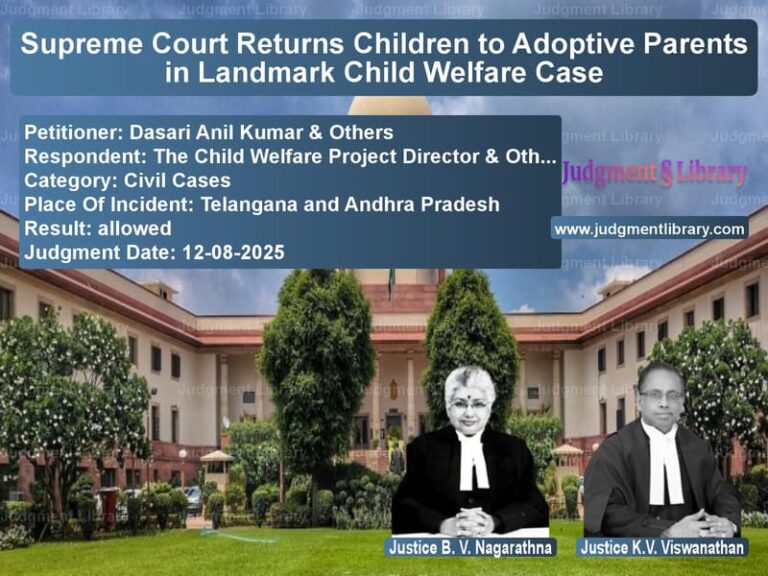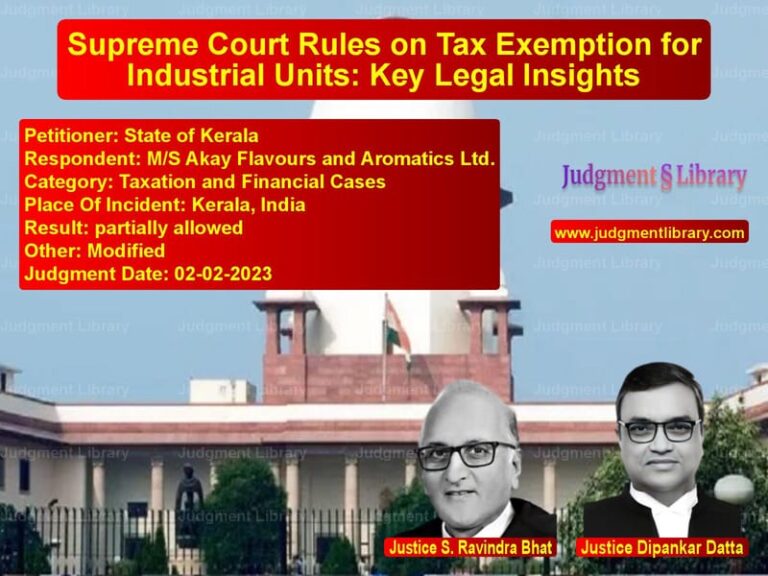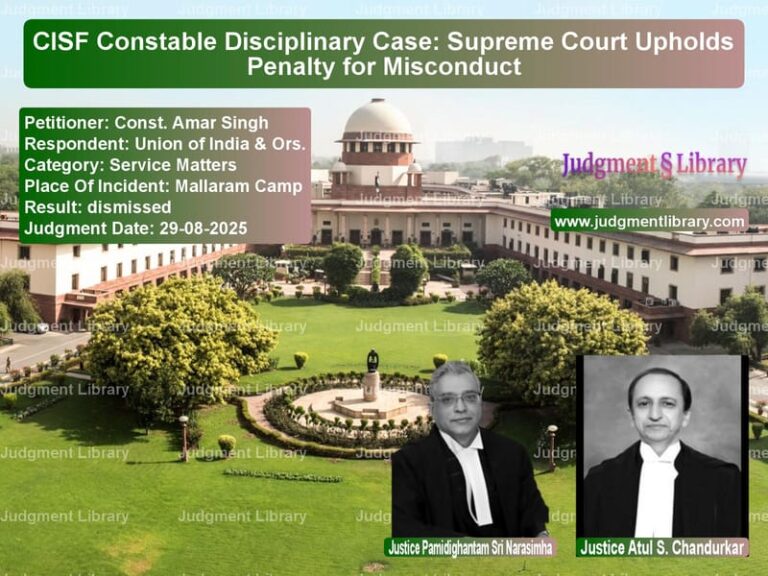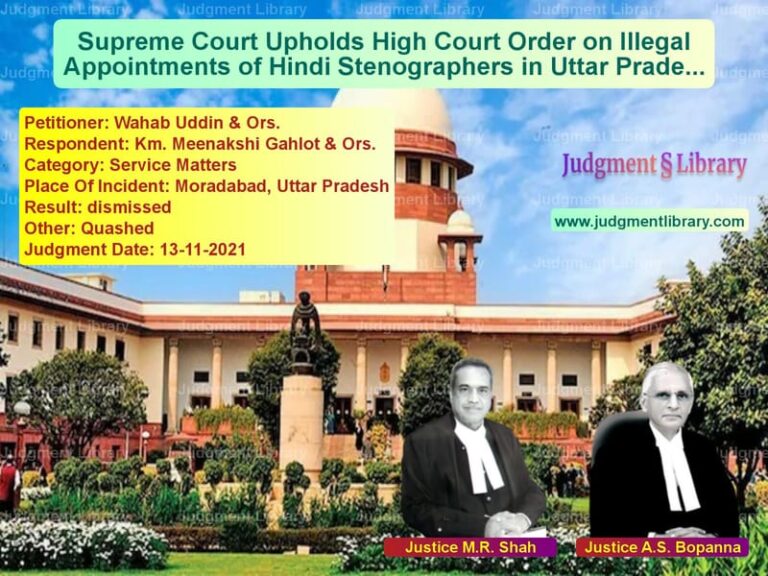Voluntary Retirement vs. Resignation: Supreme Court Clarifies Employee Rights
The Supreme Court of India recently ruled on a crucial case involving voluntary retirement and resignation in Rajasthan State Road Transport Corporation Ltd. vs. Smt. Mohani Devi & Anr.. The case addressed whether an employee’s resignation should be treated as voluntary retirement when the employer had failed to respond to a prior request for retirement.
Background of the Case
The dispute arose when late Shri Hari Ram, an employee of the Rajasthan State Road Transport Corporation (RSRTC), applied for voluntary retirement on July 28, 2005, citing deteriorating health conditions. However, the corporation did not take any action on his request.
Subsequently, on May 3, 2006, Shri Hari Ram submitted his resignation, citing worsening health and depression. The resignation was accepted by the RSRTC on May 31, 2006, and he was relieved from service. After his death in 2011, his wife, Smt. Mohani Devi, filed a writ petition before the Rajasthan High Court, arguing that her husband’s resignation should be treated as voluntary retirement, entitling him to full retirement benefits.
The Rajasthan High Court ruled in favor of the petitioner, directing the RSRTC to treat the resignation as voluntary retirement and release all retiral benefits. RSRTC then appealed to the Supreme Court.
Key Legal Issues Raised
- Should an unresponded voluntary retirement application be treated as accepted?
- Does submitting a resignation nullify a prior voluntary retirement request?
- Did the High Court err in directing the employer to treat resignation as voluntary retirement?
Arguments by the Appellants (RSRTC)
RSRTC contended:
- The voluntary retirement application was never accepted, and hence the employee continued in service.
- The employee himself later submitted a resignation, which was accepted in the usual course.
- The petitioner’s husband received all terminal benefits applicable to resigned employees and did not challenge his resignation during his lifetime.
- The High Court erroneously assumed that non-rejection of the voluntary retirement application implied its acceptance.
Arguments by the Respondents (Smt. Mohani Devi)
The respondent, wife of the deceased employee, argued:
- The employer failed to act on the voluntary retirement application within the prescribed period, making it a deemed acceptance.
- Her husband had mistakenly submitted a resignation when he intended to retire voluntarily.
- The corporation’s inaction resulted in financial loss to the employee, as resignation denied him full pensionary benefits.
- The High Court rightly directed the corporation to grant retiral benefits since the resignation was submitted under duress.
Supreme Court’s Observations and Ruling
The Supreme Court examined the provisions of voluntary retirement and resignation under the Rajasthan Civil Services Pension Rules, 1996.
- The Court ruled that voluntary retirement requires explicit acceptance by the employer and cannot be deemed accepted merely because no response was given.
- The Court emphasized that resignation and voluntary retirement have different legal consequences, and once an employee submits a resignation, it supersedes any prior request for voluntary retirement.
- The Court noted: “The act of voluntarily resigning from service extinguishes any rights associated with an earlier application for voluntary retirement.”
- The Court found that the employee had accepted resignation benefits, and there was no record of him contesting the acceptance of his resignation.
- Since the resignation was voluntary and formally accepted, the High Court’s decision to convert it into voluntary retirement was legally unsustainable.
Accordingly, the Supreme Court set aside the High Court’s ruling and upheld the validity of the resignation.
Key Takeaways from the Judgment
- Voluntary Retirement Requires Acceptance: Employees cannot claim retirement benefits if their voluntary retirement request was never accepted.
- Resignation Supersedes Retirement Requests: Once an employee resigns, any previous request for voluntary retirement becomes irrelevant.
- Timely Legal Action is Necessary: Employees must challenge employment decisions during their lifetime rather than posthumously.
- Employer’s Duty to Respond: While voluntary retirement requires explicit acceptance, employers should process such applications within a reasonable timeframe to avoid disputes.
Conclusion
The Supreme Court’s ruling in Rajasthan State Road Transport Corporation Ltd. vs. Smt. Mohani Devi & Anr. sets a crucial precedent in employment law. It clarifies the legal distinction between resignation and voluntary retirement, ensuring that employees and employers understand the different legal consequences of each.
The judgment upholds the importance of formal acceptance in voluntary retirement cases and prevents the retrospective alteration of employment decisions after an employee’s death. This decision reinforces the need for clear communication and due process in employment separations.
Petitioner Name: Rajasthan State Road Transport Corporation Ltd..Respondent Name: Smt. Mohani Devi & Anr..Judgment By: Justice R. Banumathi, Justice A.S. Bopanna.Place Of Incident: Rajasthan.Judgment Date: 15-04-2020.
Don’t miss out on the full details! Download the complete judgment in PDF format below and gain valuable insights instantly!
Download Judgment: Rajasthan State Road vs Smt. Mohani Devi & A Supreme Court of India Judgment Dated 15-04-2020.pdf
Direct Downlaod Judgment: Direct downlaod this Judgment
See all petitions in Pension and Gratuity
See all petitions in Employment Disputes
See all petitions in Public Sector Employees
See all petitions in Judgment by R. Banumathi
See all petitions in Judgment by A. S. Bopanna
See all petitions in allowed
See all petitions in Quashed
See all petitions in supreme court of India judgments April 2020
See all petitions in 2020 judgments
See all posts in Service Matters Category
See all allowed petitions in Service Matters Category
See all Dismissed petitions in Service Matters Category
See all partially allowed petitions in Service Matters Category







